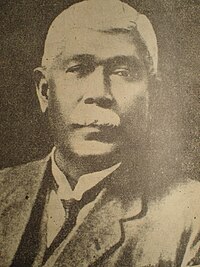James Peiris
|
The Honourable Sir James Peiris JP |
|
|---|---|
 |
|
| Vice-President of the legislative council | |
| Personal details | |
| Born | 20 December 1856 |
| Died | 5 May 1930 |
| Nationality | Ceylonese |
| Alma mater |
St John's College, Cambridge, Colombo Academy (Royal College, Colombo) |
| Occupation | Politics |
| Profession | Barrister |
| Religion | Christian |
Sir James Peiris JP (1856 – 1930) was a prominent leader in the Sri Lankan independence movement, the first elected Vice-President of the Legislative Council of Ceylon and the first native Governor of Ceylon (Acting).
Born on 20 December 1856 to T Martinus Pieris and Apolonia de Soysa, a wealthy and a traditional ship-owning family, who faced comparative poverty 15 years later along with the death of his father. Peiris was educated at Colombo Academy (now Royal College, Colombo) where he excelled in studies winning the Turnour Prize and the Shakespeare prize. He won the English University Scholarship in 1877 and proceeded to St John's College, Cambridge at the University of Cambridge. At Cambridge he had the rare distinction of obtaining a double first – a first class in the Law Tripos and a first class in the Moral Science Tripos. There he was the first non-European to be elected President of the Cambridge Union in 1882. Peiris was called to Bar at Lincoln's Inn in England thus becoming a barrister. He refused to join the Ceylon Civil Service and instead started a law practice. In 1902 he accepted for a short time the office of District Judge of Galle. As a lawyer he played a pioneering role in constitutional reform.
In 1892, as President of the Ceylon National Association (founded by Sir Charles Henry de Soysa), Peiris led the campaign to abolish the 'paddy (grain) tax', for which he was recognised by the Cobden Club. It was the first instance that the tax was abolished in the recorded history of the island. Peiris's entry into politics was as a Member of the Colombo Municipal Council from 1898 to 1908 representing the Slave Island ward, and served on the Public Works Council. Though a reluctant politician at first, Peiris initiated constitutional reforms such as the abolition of the then system of racial representation and the introduction of the elective principle in place of nomination.
...
Wikipedia
